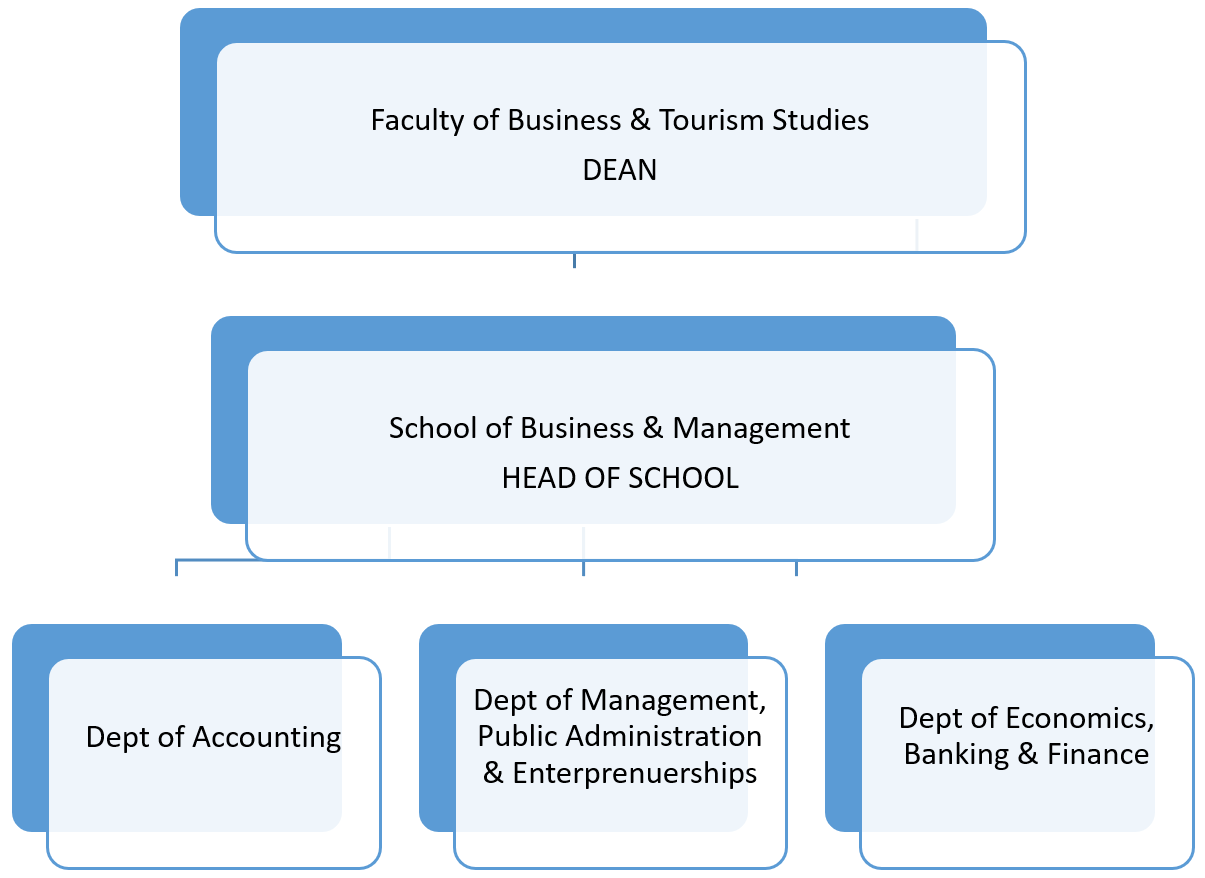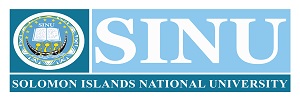Overview
The School of Business & Management (SBM) offers Bachelor, Diploma and Certificate programs in Accounting, Economics, Finance, Business Entrepreneurship and Management. We have qualified and experienced staff who are working in each of the department.
The primary objective of the school is to train, teach, educate and guide students in the art of business administration and the management of people, processes and financial resources. The school offers courses from certificate to degree levels. SBM courses cover a wide range of business topics from Typewriting and Basic Computer Skills to Accountancy, Law, Economics, Banking and Finance, Marketing and Management. Graduates from the SBM are highly sought by both Government and private sector Industries across the Solomon Islands.
The School of Business & Management comprises of three departments at Kukum Campus.
Structure

Departments
- Department of Accounting
- Department of Management, Public Administration & Entrepreneurship,
- Department of Economics, Banking & Finance.
Programmes
Currently, the SBM offers
- Two Degree programmes:
- Bachelor of Accounting
- Bachelor of Business Entrepreneurship
- Two Diploma programmes:
- Diploma of Business in Finance
- Diploma of Business in Administration
- Two Certificate programmes:
- Certificate in Business Studies
- Certificate in Secretarial Studies
Preparations for the introduction of two additional undergraduate degrees plus a Master’s degree in Business Administration are works-in-progress.
Other Information
Students are required to attend lectures, tutorials and other sessions proposed for the course. Resources will be posted online through Moodle for students’ access. It is highly recommended that students prepare for each class and tutorial by reading the material prior to event. From time to time there will also be reading materials provided in class, other than lecture notes. Students should use the library, websites and Google searches for important tools which can enhance their study, assignment researches and examination preparations.
Attendance and participation in class discussions and activities are expected of all students enrolled in this class. Attendance roll will be taken regularly and at any moment during each class meeting. Certain marks is awarded for tutorial participation out of the whole mark. Students must be present and participating in class discussion and activities in order to obtain credits. If you have trouble turning in an assignment to the instructor on time, it is your responsibility to inform your instructor of this fact before the due date. If you don’t, you may be subject to point loss. Late work may be refused or accepted with some point loss at the discretion of the instructor.
Work early in the week to ensure that you can get things done in a timely manner. If you plan to become a leader and manager it is important that you learn some of the essential values of the organizational communication. Three of the most important values are those of self-motivation, dependability, and participation.
Please advise staff if you have any type of documented disability so that we may be able to assist in accommodating any special needs you may have. Special-need students may also contact Office of Academic Services.
Written assignments must be submitted on or before the specific dates. Late assignments will lose some percentage of the total value of the assignment per 24-hour period overdue in accordance on the unit outline. Late assignments received more than specified days after the due date without an approved extension will not be accepted and will receive a zero grade. Extension to due dates will be given in exceptional circumstances in the judgment of the course controller. Requests for extension must be made in writing (or by email) one week prior to the due date of the assignment. Example of reasons, which would normally be acceptable:
- Representation in a national or major sporting or cultural event
- Sickness, which prevented attendance as supported by a medical certificate
- Death or severe illness of a close relation or friend.
The following excuses would not normally be acceptable:
- Family reunions;
- Being a spectator at sporting events;
- Participation in events that could be scheduled at alternative times;
- Medical certificate with insufficient information;
- Part-time employment
- Student saying that they have been unwell
- Pick or drop friends/relatives at a destination (point cruise port, bus terminal etc.)
If a student shows up in class late for more than 15 minutes, it will be considered as tardiness. Tardiness twice will equal to one unexcused absence. Students should note that absence from class, excused or unexcused, does not give students the right to postpone turning in assignments. Unexcused absences and tardiness may negatively affect the final grade.
The School of Business & Management best practice requires all students to properly wear decent cloths during the school day and the field-trip day. When wearing own clothes students are reminded to wear clean, neat and in good condition clothes at all times.
While grooming requirements will vary between male and female students, it is important that both look clean and presentable while you are at the premises. The physical appearance of students helps to maintain your overall appearance; hence we encourage students to wash, brush hair and brush teeth. The Institute does not permit smoking and chewing of betel nut on premises.
Please advise staff if you have any type of documented disability so that we may be able to assist in accommodating any special needs you may have. Special-need students may also contact Office of Academic Services This paragraph is repeated elsewhere.
The Faculty of Business and Tourism Studies does not tolerate plagiarism and other forms of academic dishonesty. Conduct that violates generally accepted standards of academic honesty is defined as academic dishonesty. "Academic dishonesty" includes, but is not limited to, plagiarism (the appropriation or stealing of the ideas or words of another and passing them off as one's own), cheating on exams or other course assignments, collusion (the unauthorized collaboration with others in preparing course assignments), and abuse (destruction, defacing, or removal) of resource material. Violation of these academic standards may result in removal or failure.
Cheating is defined as:
- Copying another's test of assignment
- Communication with another during an exam or assignment (i.e. written, oral or otherwise)
- Giving or seeking aid from another when not permitted by the instructor
- Possessing or using unauthorized materials during the test
- Buying, using, stealing, transporting, or soliciting a test, draft of a test, or answer key
Plagiarism is defined as:
- Using someone else's work in your assignment without appropriate acknowledgement
- Making slight variations in the language and then failing to give credit to the source
Collusion is defined as:
- Collaborating with another, without authorization, when preparing an assignment
If you have any questions regarding academic dishonesty, ask. Otherwise, I will assume that you have full knowledge of the academic dishonesty policy and agree to the conditions as set forth in this syllabus.
Further Information:
Refer to SINU Academic Policy and other University policies
Head of School

Mr. Silas Qopu
2018 - Current lecturer at SBM
2016 – 2017 Master Professional Accounting UOW, Australia
2015 – Assistant Lecturer SBM
2014 – MYOB Certification, Complete Business Solusion, Willington NZ
- Work attachment with Vonders Accountant Limited, Willington NZ
2010 – 2013 Assistant Lecturer SBM
2009 – Partner job with CPP Property Development Services (Admin & Finance Officer)
2008 - Bachelor of Commerce in Accounting (USP, Fj)
